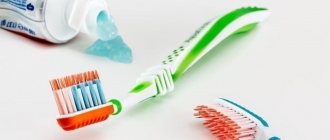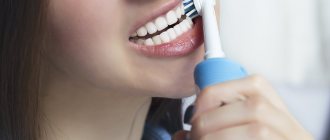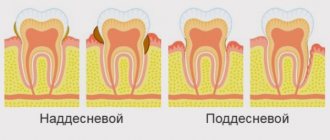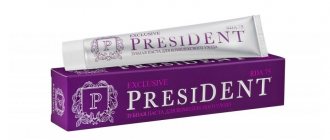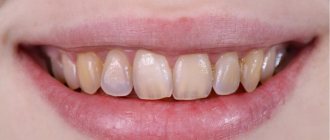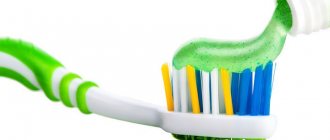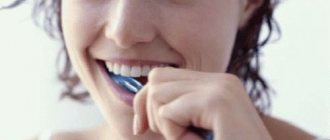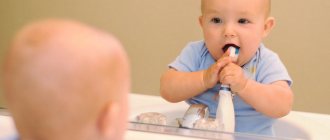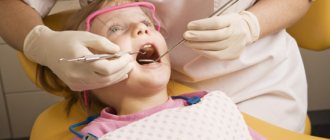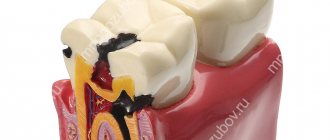From this article you will learn:
- how to properly care for your teeth,
- what is the best way to brush your teeth,
- how to protect teeth from caries.
The development of caries occurs with the participation of cariogenic bacteria in the oral cavity, which metabolize food debris stuck between the teeth after eating, turning them into lactic acid.
The acid dissolves the surface layer of tooth enamel, initially leading to the appearance of white chalky spots, which are the most initial, yet reversible, form of caries. White spots on human teeth are symptoms of the appearance of foci of demineralization of tooth enamel, in which acid has dissolved a significant part of the minerals (hydroxyapatite). If the acid attack continues for a long time, then the demineralization process reaches such a degree that the density of the enamel not only decreases, but its structural destruction occurs - a carious tooth defect is formed. The latter can be cured only by filling the tooth.
Thus, the main role in the development of caries is played by 1) microbial plaque, 2) food debris. Good regular oral hygiene can remove both of these components from teeth, but it is also important to avoid constant snacking between meals and frequent consumption of sugar-sweetened drinks. Therefore, if you are asking yourself how to get rid of tooth decay, then proper regular oral hygiene is the most important part of protecting your teeth from tooth decay and gum disease. And below we will tell you what it should be.
Important: dental care may include not only regular teeth brushing, but also additional measures that will help you strengthen your tooth enamel even more effectively. For example, the risk of developing caries can be further reduced by remineralizing teeth (we are talking about professional and home fluoridation of teeth). And we will also talk about all this in detail below.
In what cases does dental caries develop: risk factors
The condition of teeth is one of the main indicators of the overall health of the human body. Therefore, preventive measures aimed at reducing the risk of caries development are an important element of comprehensive health improvement. To protect teeth from carious lesions, it is necessary to understand what contributes to the development of the disease.
There are three main risk factors:
- dental plaque and the microbes it contains;
- increased amount of sugar in food;
- lack of fluoride in food and water.
In addition to these main factors in the development of caries, to varying degrees, the risk of pathology may depend on the level of solar radiation, gender and age, climatic and geographical living conditions. The likelihood of illness increases with pathological pregnancies, systemic and acute infectious diseases, during radiotherapy and other influences that weaken the immune system. An important risk factor is insufficient or improper dental and oral hygiene.
Comprehensive prevention of caries in adults involves influencing the main risk factors using different methods. Thanks to such preventive measures, it is possible to eliminate or reduce the risk of developing dental caries.
Causes of caries formation
The main cause of this disease is insufficient oral hygiene or improperly performed procedures. But there are factors that increase the risk of caries:
- Unbalanced diet;
- Crowding of teeth (dense arrangement);
- Violation of metabolic processes in the body;
- Excessive consumption of sugar-containing foods;
- Mechanical injuries to tooth enamel;
- Diseases of the endocrine system;
- General decrease in immunity after illness.
The main cause of caries is always the activity of cariogenic bacteria in dental plaque.
Prevention of dental caries: primary, secondary and tertiary
In modern dentistry, there are three important stages of caries prevention. Primary prevention helps prevent the development of dental caries. It involves performing procedures that eliminate the factors and causes that provoke the disease. Secondary allows you to detect the disease at an early stage and take measures that will stop its development and prevent its reappearance. Tertiary is a set of measures after the main treatment. It can be aimed at restoring dentition, chewing function, or the lost appearance of teeth.
How to notice the disease in time
The disease develops in several stages. They are also called types of carious process. So, the stages of dental caries are as follows:
- The initial process, or spot stage. It is characterized by the appearance of a spot of a different color on the enamel. This may be a small point of a chalky shade - then it is called “white spot caries”. The area may also be dark. Often such spots are difficult to detect on their own, especially since the disease is not accompanied by other symptoms.
- Superficial caries. One or more cracks of a darker color appear on the enamel. In response to sour, sweet, cold and hot foods, aching pain is noted in the damaged tooth.
- Average caries. This process is indicated by toothache, which appears only in response to eating hot or cold food. A “hole” is visible and palpable with the tongue on the enamel.
- Deep process. The transition to this stage is characterized by the appearance of constant toothache.
For an accurate diagnosis of dental caries, contact a specialist.
Methods of primary prevention of caries
They are divided into endogenous (impact on internal factors) and exogenous (impact directly on the tooth surface).
Endogenous prevention measures include:
- complete, balanced, varied diet;
- activities aimed at strengthening the immune system;
- elimination of stress factors;
- taking vitamin and mineral supplements and saturating the body with fluoride, calcium and other microelements necessary for dental health.
Exogenous prevention of caries is:
- brushing your teeth daily using a good toothbrush, toothpaste and floss;
- professional cleaning by a dentist twice a year;
- treatment of tooth enamel with preparations containing fluoride;
- limited consumption of sweets and other foods rich in carbohydrates;
- use of chewing gum;
- sealing fissures (natural pits and grooves) on children's teeth.
Comprehensive caries prevention measures help reduce the likelihood of its occurrence several times.
Treatment of caries in our dentistry
If your child has dental problems or you want to prevent caries, we invite you to our clinic. We have excellent doctors who are well versed in child psychology and the treatment of dental diseases in children. We will provide a high-quality consultation, help the child get rid of fear of the dentist, if he has one, teach him how to brush his teeth correctly, and carry out all the necessary procedures to prevent the development of caries. Our child will receive only positive emotions!
The role of nutrition in preventing dental caries
One of the effective measures to combat caries is the correct approach to nutrition. The tissues of the oral cavity are sensitive to the lack of certain food components. In particular, a lack of protein in the diet prevents the accumulation of calcium and disrupts the structure and strength of enamel. At the same time, foods that are too fatty increase the permeability of the enamel, which increases the likelihood of the formation of carious lesions.
An excess of refined carbohydrates (sweets, flour products, sugar) in the diet not only reduces the resistance of teeth to the development of caries, but also weakens the immune defense, which is also a risk factor.
To prevent caries, it is important to adhere to the following dietary recommendations:
- A sufficient amount of protein must be present in the daily diet;
- eat foods containing vitamins C, D and group B;
- be sure to eat foods rich in calcium and phosphorus (milk, cheese, eggs, fish, broccoli, legumes), as well as fluoride-containing foods (sea fish, Georgian tea);
- it is necessary to limit the consumption of foods rich in “fast” carbohydrates, eat as little sweets, cakes and refined sugar as possible;
- Avoid sticky products: they can remain on the surface of tooth enamel for up to an hour, contributing to its demineralization for a long time.
The nature of your diet directly affects the condition of your teeth. A rational, fortified, balanced diet is an effective method of non-drug prevention of caries.
Why does caries occur?
When a baby is born, its oral cavity is sterile.
But then he inhales atmospheric air, comes into contact with the mother’s skin - and various microorganisms begin to appear in his mouth. Most of them are harmless and even perform a useful function: they participate in digestion and inhibit the growth of pathogenic microorganisms. But streptococci (Streptococcus mutans) are also found in the oral cavity. It is their presence that causes dental caries. During their life, streptococci produce acids that destroy tooth enamel. The more such bacteria appear in the oral cavity, the higher the concentration of acids they secrete becomes. In this case, the rate of development of the carious process increases.
Signs of caries are:
- bad breath;
- increased sensitivity of enamel;
- roughness of the tooth surface;
- dark spots on the enamel;
- cavities in teeth.
How to reduce the adverse effects of carbohydrates on teeth
Fermentation of carbohydrates under the influence of microbes leads to the production of organic acid, which destroys tooth enamel and contributes to the development of caries. It is impossible to completely stop eating carbohydrates, but it is quite possible to reduce the intensity of their influence on the development of caries. The following measures will help with this:
- Reducing the amount and, most importantly, the frequency of eating carbohydrate foods, so that the teeth come into contact with carbohydrates as little as possible.
- In some cases, your doctor may recommend switching from sugar to sweetener substitutes.
- Reducing the time carbohydrates spend in the mouth. This can be achieved in two ways: do not eat the sweet dish last, and be sure to rinse your mouth after eating.
- Avoid eating sweets at night and between meals.
If any of the recommendations are violated, to reduce the risk of caries, you need to brush your teeth and rinse your mouth.
Stopping the development of caries
It is advisable to stop the development of caries at the earliest possible stage: in this case, the disease will be much easier to treat.
At the initial stage, caries looks like a small spot. At this stage of development, it can be coated with a special gel that can restore damaged enamel. If you see a doctor on time, you may be able to do without the preparation procedure, which is, of course, completely painless.
If you start the development of caries, you will have to resort to drilling, and if the pulp is affected, this can add additional painful sensations.
In addition, ignoring caries is fraught with:
- destruction of the affected tooth and, as a result, expensive installation of an implant;
- indigestion, since the affected teeth cannot fully cope with the chewing function;
- aesthetic inconveniences.
Strengthening the immune system and reducing stress factors as methods for preventing dental caries
The most important task of the immune system is to resist the effects of microbes. If the body's defenses are weakened (including under the influence of stress), the immune system cannot resist harmful bacteria. That is why, against the background of severe stress and weakened immunity, the risk of dental caries increases.
Prevention consists of strengthening the immune system, for which the following measures are suitable:
- quality sleep of at least 8 hours;
- physical activity: daily exercise, sports;
- hardening: water procedures, sun and air baths, cool air in the apartment;
- avoidance of stressful situations;
- refusal or limitation of bad habits (smoking, alcohol);
- adherence to daily routine;
- if necessary and only as prescribed by a doctor, medications to strengthen the immune system.
Consequences
Untimely treatment of caries can lead not only to dental disease, but also to other disorders of the body:
- disorders in the immune system caused by bacteria and leading to frequent acute respiratory viral infections;
- development of various types of allergies;
- violation of the digestive system, with manifestations in the form of heartburn, the development of gastritis;
- disruption of the cardiovascular system caused by the penetration of bacteria into the circulatory system during advanced tooth damage.
In addition, we should not forget that an untreated tooth can lead to its complete destruction and removal, disrupting the aesthetic appearance and causing complexes.
Drug prophylaxis
After an in-person examination, the dentist, according to indications, may prescribe the patient one of the following methods of medicinal endogenous prophylaxis:
- additional fluoridation of food and drinking water (the amount of fluoride is calculated only by a doctor, taking into account the dose that a person already receives from food and water);
- anti-caries drugs for oral administration (usually they contain a complex of vitamins and sodium fluoride that help strengthen teeth).
There are also exogenous methods of drug prophylaxis. These include coating the teeth with fluoride varnish or fluoride gel. Fluoride varnish stays on the enamel surface for a long time, saturates it with fluoride ions, has an antimicrobial effect, and reduces pain in cases of increased tooth sensitivity. Fluoride-containing gel has a remineralizing effect on tooth enamel; it is used for applications or electrophoresis.
Preventive measures available to children
To prevent the child from encountering caries of newly erupted permanent units, their fissures are sealed. To do this, the chewing surface of the molars is coated with a special protective composition that resembles filling material in appearance. It serves as a kind of shield between the enamel and food debris. Thus, it prevents caries from occurring.
Sealing should be carried out as soon as possible after the permanent unit has erupted. Only then will it be effective.
The issue of caries prevention should be discussed with your doctor. He will assess the condition of your teeth and suggest a method that will be optimal specifically for your situation. Remember: you need to visit a dental clinic not only when toothache haunts you - it is better to do this every year for a preventive examination.
Sealing dental fissures as caries prevention
Fissures are natural depressions on the surface of teeth. Food debris accumulates in these pits, making it more difficult to remove plaque and germs from there during cleaning. In addition, in the fissure area, enamel mineralization is slowed down; its layer is thinner than on other surfaces of the teeth, so natural depressions are considered a risk zone for the development of carious lesions. The fissure sealing method is primarily used for children. Its essence lies in the fact that the recesses are closed with special sealants. As a result, food does not accumulate on the teeth, and the vulnerable spot of the tooth surface is reliably protected from the action of pathological microorganisms.
Professional dental treatment with fluoride –
At the beginning of the article, we already told you that the initial stage of caries develops due to exposure to acid secreted by cariogenic bacteria. This acid dissolves the surface layer of enamel - as a result of which the enamel loses calcium, i.e. demineralization of the enamel occurs. However, there are therapeutic measures that can strengthen tooth enamel by saturating it with minerals (fluorine and calcium). This process is called tooth remineralization.
Remineralization is not only professional (carried out in a dental office), but it can also be easily done independently using the right quality products. At home, you constantly use toothpastes with fluoride or calcium, which also contribute to the remineralization of tooth enamel, despite moderate concentrations of active ingredients. To strengthen enamel in children and adults, dentists most often use the method of professional fluoridation of teeth (using highly concentrated varnishes and gels).
Professional fluoridation of teeth is more effective compared to fluoride-containing therapeutic and prophylactic toothpastes. For example, the fluoride concentration in dental varnish is usually 22,600 ppm, and conventional dental toothpastes contain a maximum of 1,450 ppm of fluoride. And in Colgate® Duraphat medicinal pastes (which we described above) – 2800 or 5000 ppm.
In what cases is it better to choose fluoride treatment of teeth at the dentist, and in what cases is it better to use medicated toothpastes with a high dosage of fluoride at home? Read the article on fluoridation of teeth (see link above). But in general, the recommendations of the World Health Organization (WHO) recommend that fluoride prevention of caries should include both directions: firstly, the constant use of low doses of fluorides at home, and secondly, periodic professional applications of high doses of fluorides at the dentist (1 time in 3- 6 months).
The mechanism of action of fluorides (explanations below the picture) –
- Demineralization - when the pH of the oral fluid drops to pH 5.5 (i.e. becomes acidic) - the surface layer of enamel begins to dissolve and lose calcium and other trace elements. This is the starting point for the development of caries. A pH below 5.5 means an acidic environment, which is formed in the oral cavity under the influence of cariogenic microorganisms that “digest” food debris into organic acids.
- Remineralization - the surface of the tooth is coated with fluoride varnish, which promotes the formation of a layer of calcium fluoride (CaF2) on the surface of the tooth, from which calcium and fluoride ions penetrate into the enamel surface. There, fluoride ions bind to hydroxyapatite (the substance from which enamel is made), turning it into fluorohydroxyapatite. The latter is much more resistant to acid, and its dissolution begins only at pH 4.5 (i.e. at a higher acid concentration in the oral cavity). This ensures the anti-caries effect of fluorides.
Personal oral hygiene as protection against caries
Individual oral hygiene plays an important role in preventing caries. It refers to exogenous non-drug methods of prevention.
Regular brushing of teeth, tongue, removal of food debris, soft deposits contributes to the proper development and functioning of tooth enamel. The components of therapeutic and prophylactic pastes enrich the tissues of the oral cavity with calcium and phosphate salts, vitamins and microelements, making them more resistant to negative influences. Massaging the gums with a toothbrush activates metabolism, improves blood circulation in periodontal tissues, and prevents bleeding and gum disease.
Personal hygiene involves careful independent removal of plaque from the surface of teeth and gums using toothbrushes, pastes and other products.
The effectiveness of individual oral hygiene depends on several factors:
- quality and compliance of the characteristics of the toothbrush with the condition of the teeth of a particular patient;
- following proper cleaning techniques;
- the use of additional cleansing methods - irrigators, dental floss, mono-beam and orthodontic brushes, rinses.
Oral irrigators
These are real masters in the noble task of destroying bacterial plaque. It is known that caries most often occurs in places that are difficult to clean with conventional means (interdental spaces, gum line, remote areas near molars). It is irrigators that are able to efficiently and timely remove bacterial contamination from these problem areas. There are no off-limits areas for the irrigation flow, and therefore no places where plaque-forming bacterial colonies could develop.
Using a toothbrush and irrigator together provides a level of cleanliness that reduces the risk of tooth decay. Therefore, we strongly recommend that all those who understand the importance of effective hygienic protection of the oral cavity purchase a high-quality irrigator and use it regularly.
Oleg Ilyashenko
How to brush your teeth correctly to avoid caries?
The toothbrush should have a small head to easily penetrate hard-to-reach areas of the oral cavity, removing plaque even from distant teeth and from interdental spaces. The stiffness of the bristles is of great importance. The best choice for most adult users is a medium-hard brush. It will clean the surface of the teeth quite intensively, without damaging the gums or scratching the enamel.
However, for children and those with sensitive teeth and gums, brushes with soft bristles are needed. Regarding the correct choice of the optimal toothbrush, as well as toothpaste with the appropriate composition, it is better to consult with your dentist. He will be able to make recommendations based on an in-person examination of the oral cavity.
Even a properly selected brush and good toothpaste will not protect against caries if you brush your teeth incorrectly. Therefore, it is important to learn a technique that will allow you to most effectively clean your teeth and oral cavity from bacteria. There are several different ways to clean teeth in dentistry. One of the widely used is the standard Pakhomov method:
- The dentition is conventionally divided into segments.
- Begin cleaning from the upper right segment, from the distant chewing teeth. They alternately move from segment to segment along the upper jaw, and then move on to cleaning the lower row of teeth in a similar way.
- According to Pakhomov’s method, when cleaning the lateral front and back surfaces of the teeth, the brush moves in the direction from the gums to the edge of the tooth. Chewing surfaces are cleaned with back-and-forth movements.
- Finish cleaning with circular movements in each segment.
Please note that this cleaning method is suitable for those who use regular manual toothbrushes. There are nuances in using electric toothbrushes, and the method of using them is always detailed in the instructions. The main difference is that an electric toothbrush does not require mechanical movements; it simply needs to be moved from tooth to tooth without applying too much pressure.
After brushing your teeth with a brush and toothpaste, it is recommended to additionally clean the interdental spaces with floss or irrigator, and also use the mouthwash as a solution for the prevention of caries.
Proper dental care -
Unfortunately, all people understand the term “good oral hygiene” differently, believing that everything is fine with their hygiene, and that all dental problems are to blame (hereinafter on the list) - water, bad heredity, pregnancy, etc. . Below we have described in detail for you how often and how to brush your teeth correctly, as well as what hygiene products are best to use.
How many times a day should you brush your teeth?
Most people know that they need to brush their teeth twice a day. Everything is correct, but this is only the minimum value. Normally, teeth are brushed after every meal, i.e. 3 times a day. If you are afraid that your colleagues at work will call you a cleaner if they see you brushing your teeth in the toilet during your lunch break, then you need to make a choice - between clean teeth, the absence of caries and bad breath, and the respect of dirty-toothed colleagues.
If a toothbrush and paste at work are unacceptable to you, then the minimum amount of hygiene that will allow you to remain Homo sapiens is dental floss + chewing gum. The most important thing in this combination is the use of dental floss, because... food gets stuck between the teeth (and we are not talking about stuck pieces of meat, but about soft food residues, which cause much more damage to the teeth, because they consist of quickly digestible carbohydrates and therefore are most quickly processed by bacteria into acid).
Diet – effective prevention of dental caries is impossible without following a diet. For example, it is very good if you brush your teeth 3 times a day after each main meal. But, if you decide to eat chocolate, cookies, sweets, nuts between main meals... the carbohydrates stick to your teeth again and bacteria immediately begin to convert them into acid. Therefore, all snacks should be eaten at the end of the main meal, and after that, immediately brush your teeth.
It is the wrong diet and frequent snacking on cookies and other carbohydrates that are the root cause of caries in children (this also applies to sugary drinks - juices, soda, liquid mixtures). Children often develop so-called bottle caries, which affects almost all teeth (when parents, to prevent the child from crying, give him a bottle of formula for the whole night or day). And without solving the problem with diet, no prevention of caries in children is simply possible.
If you are asking yourself how to get rid of caries at home, then following the recommendations of this article can almost completely save you from the appearance of new foci of caries. It's up to your willpower and motivation, because sometimes you are too lazy to get up and go straight away to brush your teeth, or finally start regularly using dental floss after every meal.
Proper hygiene scheme -
After each meal, you need to follow the following sequence: 1) flossing, 2) brushing with a toothbrush and toothpaste. If you don’t have toothpaste and a brush, you should always have dental floss and chewing gum with you. Floss will remove food debris, and chewing gum works by stimulating salivation (saliva has a certain buffering capacity that neutralizes acids in the mouth).
It is very important not only how to brush your teeth, but also when to do it. In the morning, it is best to brush your teeth after breakfast (for people with a lot of plaque and carious teeth, this can be unpleasant, so it is recommended for such patients to brush their teeth both before and after breakfast). As for all other oral hygiene sessions, teeth should be brushed within the first 5 minutes after eating.
Using dental floss –
Let's be honest - without dental floss there can be no talk of good hygiene. What do you think: why is the most common location of caries in the interdental spaces? Precisely because food debris gets stuck there, which cannot be removed by any fancy toothbrush models or even irrigators. If the instructions for a brush or an advertisement tell you that it perfectly cleans the spaces between teeth, this is all untrue and is only a publicity stunt. And this equally applies to electric, ultrasonic, and other models of brushes and attachments for them.
It is very important that you understand the following - you should use dental floss not only when you feel that a piece of meat is stuck in your teeth. After eating, so much soft sticky food debris accumulates in the interdental spaces that will not cause you any concern, but it is they (and not pieces of meat) that are the root cause of caries, because... Such food residues consist predominantly of carbohydrates that are easily digestible by bacteria.
Dental floss should be used after every meal, cleaning absolutely all dental spaces. This usually takes about 1 minute, but at the beginning (while you learn to use it) it may take longer. The thread should always be in your pocket or purse. You can use it at a party, in the restroom of a restaurant, or even just on the street. Everything will depend only on your desire to have clean teeth and a pleasant breath.
How to use dental floss correctly: video
→ Types of dental floss, and which one is better
If there are bridges on the teeth, braces -
In the presence of braces and bridges in the oral cavity, conditions are created for the retention of food debris. In the presence of bridges, food is stuffed, as a rule, under the intermediate part of the bridge, which imitates the missing tooth. Therefore, for good hygiene, an ordinary toothbrush and paste, as well as dental floss, will no longer be enough in this case (24stoma.ru).
Special devices called irrigators are designed for these purposes. Such devices deliver under pressure a thin pulsating stream of water, saturated with air microbubbles, with the help of which food debris and microbial plaque are washed away (Fig. 6). Irrigators are also indicated for patients with chronic gum inflammation, because... They also allow you to wash periodontal pockets using special nozzles.
Important: any caries you develop, even a single one, is an indicator that there are defects in your hygiene. You must understand that there is no norm for the formation of a certain number of caries lesions per year. Normally, there should be no caries at all, and if it appears, then this is a question of how correctly you brush your teeth, how regularly, whether you are familiar with dental floss, and also how correct your diet is.
When caries develops, microbial plaque and food debris remain at the edge of the corner. Adequate oral hygiene allows complete removal of both. Predisposing factors, of course, also exist. For example, a low concentration of lysozyme in saliva (this is an enzyme that inhibits the growth of plaque) is of a genetic nature, but this factor is only secondary for the development of caries.
Or the buffering capacity of saliva is too low, which does not effectively neutralize acid in the mouth. This usually occurs in patients who consume too many carbohydrates. In patients with a balanced and protein diet, the buffer capacity of saliva is always normal. Those. here again questions about your diet. Often drinking wine or fruit juices (acid), sweet soda (carbohydrates) - all this also leads to demineralization of teeth and increases the risk of caries.
Chewing gums as caries prevention
Chewing gum may help prevent tooth decay by increasing saliva production. Salivary fluid washes each tooth, removing dirt and germs from it, has an antiseptic effect on the oral cavity, and neutralizes plaque acids. For preventive purposes, it is recommended to chew gum with sweeteners for several minutes after each meal, especially sweets. Remember that comprehensive preventive measures will help maintain the health and appearance of your teeth for a long time.
Nutrition rules
One of the ways to prevent caries is proper nutrition. Dentists give the following general recommendations:
- limiting the consumption of sweets. It is better to replace confectionery and chocolate with dried fruits and honey; soda - compotes. It is important to know when to stop and not eat too many carbohydrates, and rinse your mouth after each meal;
- balanced diet. In order for the hard tissues of the tooth to receive the required amount of minerals, the menu should include fermented milk products, cheese, fresh herbs, nuts, meat, and lean fish;
- eating solid foods. Apples, carrots, and other tough fresh vegetables and fruits are not only healthy, but also mechanically clean the enamel, stimulate blood circulation in the gums, which helps maintain oral health;
- careful attention to the temperature of food and drinks. It is better not to eat extremely hot or cold foods, and especially not to alternate between them. Otherwise, the enamel may not withstand it - it may become covered with microcracks, and this contributes to the accumulation of plaque and the proliferation of bacteria;
- careful consumption of solid foods. It is better to eat nuts and other extremely hard foods carefully, making sure that particles do not get stuck in the interdental spaces and fissures.
What to do if caries has already appeared
You need to understand that treating a disease such as caries at home is almost impossible. The specialists of the Dent Prestige clinic will definitely help you solve this problem. If a person notices that his teeth are turning black, small holes appear and there is pain, then he should do the following:
- contact a highly qualified dentist;
- undergo examination and dental treatment;
- restore damaged areas of teeth in the dental office by installing fillings, extensions or implants.
If a person does not pay attention to one diseased tooth, then the next ones will begin to deteriorate. That is why, if there is the slightest blackening, you should immediately go to the dental clinic and resolve the situation before it gets too advanced.
Only a professional dentist knows how to remove caries from teeth, and it is worth contacting him. To prevent caries, you should take care of your dental health from childhood. There is no need to think that baby teeth should not be treated, because it is their condition that determines how healthy the permanent teeth will grow.
Timely visits to the dentist are the key to the absence of caries
Even a person who has completely healthy teeth should go to the dentist at least once every six months. Since it is impossible to identify minor pathological processes on your own, without medical supervision the problem goes further.
Regular dental examinations will help prevent tooth decay because:
- the doctor will give an objective assessment of the condition of the oral cavity;
- The dentist will always advise you on how to brush your teeth, what toothpaste and brush to choose;
- the doctor will notice minor problems and eliminate them, preventing further development of the pathology.
Not knowing how to prevent tooth decay can lead to serious problems, including financial ones. To prevent them, you need to contact the dentists of the Dent Prestige clinic in a timely manner and go for all scheduled examinations. Working closely with your dentist will help a person protect their teeth from caries. Preserve their beauty and health.
